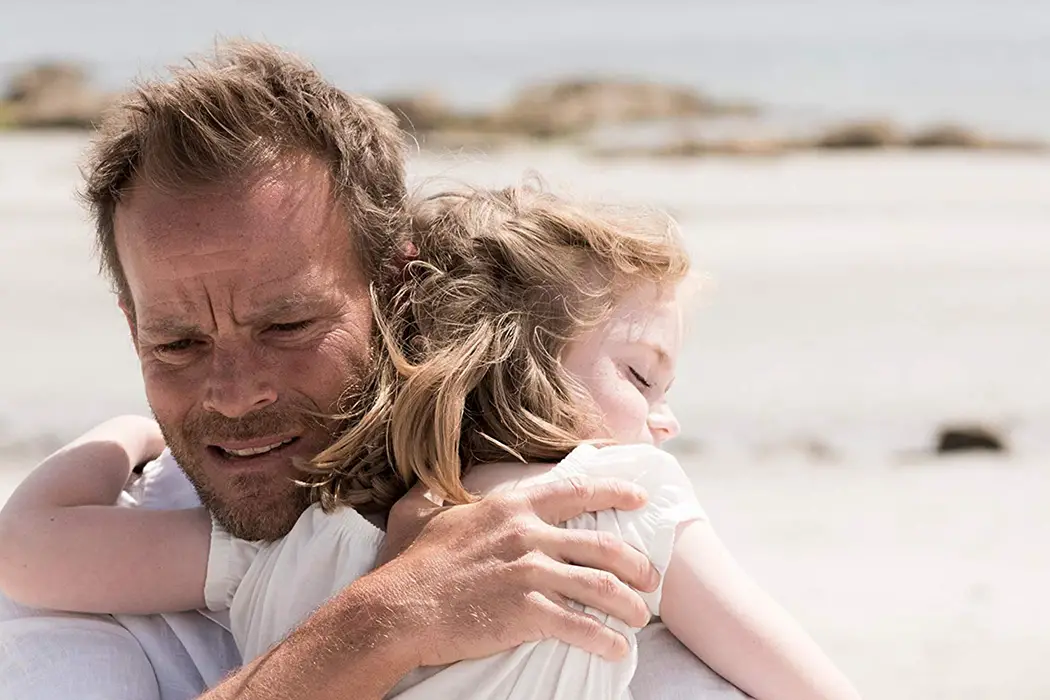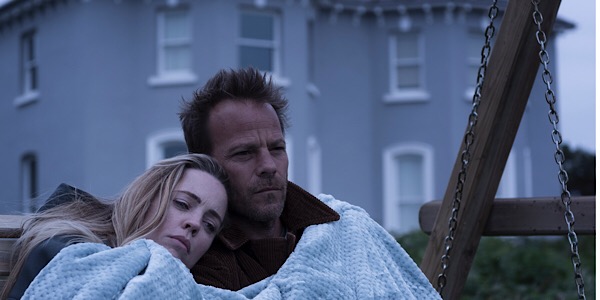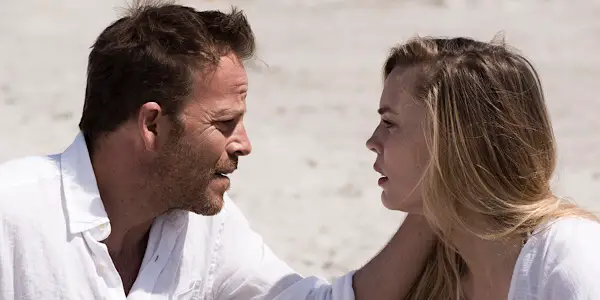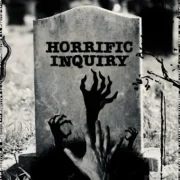DON’T GO: Parental Grief With A Sci-Fi Sampling

Kristy Strouse is the Owner/Editor in Chief of Film Inquiry,…
Loss can be earth-shattering. The loss of a child? That can be even more devastating. This isn’t a new plot device to film, but Don’t Go uses this as a catalyst, threading trauma with guilt and a veneer of curiosity. Is it possible to get your loved one back? Director David Gleeson constructs a haunting but picturesque film as the answer to this question is explored.
Moving On
With the tragic loss of their young daughter Molly (Grace Farrell) still new and raw, writer Ben (Stephen Dorff) and wife Hazel (Melissa George) move to a coastal Irish town to start again.

They are fixing up a hotel, while he’s teaching at a local Catholic school. There he shares the occasional, comic conversation with Father Sean (Simon Delaney), a refreshing dose of lightheartedness amid a film that is perpetually grim, while the couple seems to go through the motions.
Then things change when Ben begins to have a recurring dream where he’s brought back to a memory of his family on the beach, building sandcastles. Along with his frequent transports back in time, he also begins seeing the words “Seas the Day” (spelled incorrectly as a child would) everywhere; out of his printer, in the sand, even at school.
What does it mean? Is this a message from the beyond?
Serena (Aoibhinn McGinnity) arrives, dealing with the loss of Molly in her own self-destructive way. There’s a subplot here with Ben and her that unfortunately screams pedestrian, but it’s a vessel that provides a visualization for the weight of their guilt.
When Ben wakes from one of these dreams and has an item in his hand seemingly pulled out (yes – like Nightmare on Elm Street) he begins to wonder if there’s a possibility he could bring Molly out. Those who love him wonder if he’s gone crazy, and his frequent drinking doesn’t help, but Ben wants to believe.

Don’t Go is a psychological thriller, but it begins to set its sights towards science fiction, which is an intelligent decision not wholly fulfilled. The last two thirds of the film are where things really begin to find their place. Written by Ronan Blaney and David Gleeson, the story takes careful steps to promote confusion on its viewers. Is he losing his mind? Or is he finding out something remarkable?
The script falters in consistency at times, and is very lean; with a film cresting at 91 minutes, it takes its time hitting the right notes. Don’t Go could have profited from a smoother vision, with more eagerness that’s attempted in the finale.
A Way Through
It cannot be ignored that this film is shot with a gentle splendor, expanding beyond just the Irish beaches, and a melancholy sunset to light playing through the windows. For this alone, you could watch and be swept up in a visual waltz between viewer and film. The cinematography of James Mather softens the disproportionate tale.
The continual expertise with the lens is a comfort throughout. When you’re dealing with such a dramatic story, this camera work reminds us that there is beauty to be had in every moment, from every angle. It’s also very immaculate looking, especially the blaring flashbacks, at conflict with the moody tone.
The acting power, specifically of our two leads, is on full display. Each of the characters is grieving in their own way. Melissa George is underused here and doesn’t get nearly enough time to showcase her potential.

Don’t Go is really Stephen Dorff’s movie. His gruff inward emotional torment is a highlight as we watch him break down. As husband and wife struggling with their loss, they’re also just trying to find ways to be around each other again. Some of their strained interactions filled with palpable grief are the most moving scenes of the movie.
While the supporting roles hit their mark, the points are a bit contrived. As are certain scenes, such as a night of marijuana that warrants a sigh. At times challenging, at times heartbreaking, this film isn’t always gripping, but when gutted there’s a viable heart. It’s one I’d recommend, but not with an adept enthusiasm.
Don’t Go: Conclusion
If you can forgive the grumbling start, there’s an earnest story itching to be heard. One, in part, that you’ve seen before. However, there’s a believability achieved through credible acting, a plethora of scenery captured in a way that soothes and slays, and a compelling enough conceit, that keeps Don’t Go from becoming too ordinary.
What did you think? Did you like the film? Let us know in the comments below!
Don’t Go can currently be streamed VOD and was released in theaters on October 26th.
Does content like this matter to you?
Become a Member and support film journalism. Unlock access to all of Film Inquiry`s great articles. Join a community of like-minded readers who are passionate about cinema - get access to our private members Network, give back to independent filmmakers, and more.
Kristy Strouse is the Owner/Editor in Chief of Film Inquiry, writer, podcaster, and all around film and TV fanatic. She's also VP of Genomic Operations at Katch Data and is a member of The Online Association of Female Film Critics and The Hollywood Creative Alliance. She also has a horror website: Wonderfully Weird & Horrifying.













